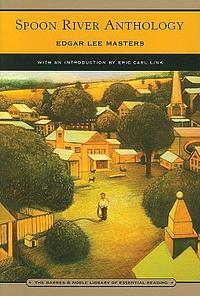Take a photo of a barcode or cover
I don't think I understood all (or even half of it). I loved the concept but struggle with poetry in general. The passages I did understand were brilliant. I am glad I read it, once.
I have read this book about 50 times, in bits and pieces, and about a half-dozen from start to finish in order. I love it.
Let me start with what the book is about. This is a book of free-form poems that serves as a narrative, each poem told from the point of view of a resident of Spoon River who has died and who is telling their story after the fact, their own epitaph. Some poems go together, some stand alone, but they form the elaborate portrait of a community.
A seeming non-sequitur, perhaps, but it will come back around in the end: I love cemeteries. I love that there is a solid, physical record of a person’s life in the form of a stone or plaque, left behind to show something for their life, something that doesn’t deteriorate like their body. When I did a year abroad in Italy, I spent a lot of time in Venice. The cemetery there is on a separate island. There’s a part of the cemetery that’s basically a mausoleum built like a wall instead of a cube, and it’s all for kids who died. They were mostly babies and toddlers, but here’s the part I liked best: Each plaque had a portrait of the child next to it, painted onto porcelain, like photo transfer paper onto cloth, before transfer paper. Each person in that place had something specific to them, shaped by the person they were in life, which lived on after their death. It moved me to the point of tears. A year or so after I got back, I saw a photo in a gallery that I would have LOVED to own but it was too pricey. I’m not sure who shot it, so I’ll just describe it: a couple of rows of grey headstones with just last names carved on them. On several of them, there are silhouettes of the occupants of the graves, one guy with a cowboy hat, one woman with long hair, etc…. not sure how the artist did it, as it was a photograph of shadows, but it was pretty awesome.
Ok, here’s where it fits together: Even though Spoon River is fiction, the community becomes so vivid in the epitaphs of its residents that it feels real and timeless. I can only hope that there’s something so real left of me when I am gone.
That was a bit of a downer. Here’s an upper: It’s FREE on the Kindle (though there’s no formatting or chapter index… that’s what happens when it’s free…) (It’s probably also available in other e-book formats for free, since it’s out of copyright.)
That is all.
Let me start with what the book is about. This is a book of free-form poems that serves as a narrative, each poem told from the point of view of a resident of Spoon River who has died and who is telling their story after the fact, their own epitaph. Some poems go together, some stand alone, but they form the elaborate portrait of a community.
A seeming non-sequitur, perhaps, but it will come back around in the end: I love cemeteries. I love that there is a solid, physical record of a person’s life in the form of a stone or plaque, left behind to show something for their life, something that doesn’t deteriorate like their body. When I did a year abroad in Italy, I spent a lot of time in Venice. The cemetery there is on a separate island. There’s a part of the cemetery that’s basically a mausoleum built like a wall instead of a cube, and it’s all for kids who died. They were mostly babies and toddlers, but here’s the part I liked best: Each plaque had a portrait of the child next to it, painted onto porcelain, like photo transfer paper onto cloth, before transfer paper. Each person in that place had something specific to them, shaped by the person they were in life, which lived on after their death. It moved me to the point of tears. A year or so after I got back, I saw a photo in a gallery that I would have LOVED to own but it was too pricey. I’m not sure who shot it, so I’ll just describe it: a couple of rows of grey headstones with just last names carved on them. On several of them, there are silhouettes of the occupants of the graves, one guy with a cowboy hat, one woman with long hair, etc…. not sure how the artist did it, as it was a photograph of shadows, but it was pretty awesome.
Ok, here’s where it fits together: Even though Spoon River is fiction, the community becomes so vivid in the epitaphs of its residents that it feels real and timeless. I can only hope that there’s something so real left of me when I am gone.
That was a bit of a downer. Here’s an upper: It’s FREE on the Kindle (though there’s no formatting or chapter index… that’s what happens when it’s free…) (It’s probably also available in other e-book formats for free, since it’s out of copyright.)
That is all.
Posiblemente el mejor poemario escrito jamás. Y nunca pensé que diría esto... pero fue todo un descubrimiento.
Flashback about 30 years ago to an 11th grade English literature class. I read a couple of extracts from this book, instantly captivated by the concept of the long dead inhabitants speaking from the grave. Although I never read the entire book I actually carried around the memory of those poems and the collective message of everyone's finite time on this earth.
Flash forward 30 years and I see this book in a used bookstore in Pilsen, Chicago. I grabbed it immediately and started it up. It was as good as I remember. The astonishing thing (if you think about it) - the author (long dead), the inhabitants of Spoon River (long dead AND fictional), and 10-15 lines to condense a life - and nearly every single poem is magnificent. You FEEL the lives they've lived. You feel their hopes and dreams, drunken squabbles, and fleeting loves. The entire time the question sits there ever present in your thoughts, "What was it for? Is there meaning in all of the different lives lived if the end destination is always the same?". In this book there are no answers, just voices.
Enough of that - this book instantly vaulted to my all-time book list. It's a must read if you're interested in the power of art and how it can probe existential questions of meaning.
Flash forward 30 years and I see this book in a used bookstore in Pilsen, Chicago. I grabbed it immediately and started it up. It was as good as I remember. The astonishing thing (if you think about it) - the author (long dead), the inhabitants of Spoon River (long dead AND fictional), and 10-15 lines to condense a life - and nearly every single poem is magnificent. You FEEL the lives they've lived. You feel their hopes and dreams, drunken squabbles, and fleeting loves. The entire time the question sits there ever present in your thoughts, "What was it for? Is there meaning in all of the different lives lived if the end destination is always the same?". In this book there are no answers, just voices.
Enough of that - this book instantly vaulted to my all-time book list. It's a must read if you're interested in the power of art and how it can probe existential questions of meaning.
Wonderful. It took me three years to ease myself through all of this and I'm certain I will return to it again and again throughout my life.
This book changed the way I look at life. I picked it up for the first time a few weeks after my father died, and reading through it comforted me and helped me understand. By the time I reached to poem titled "Lucinda Matlock" I was ready to move on and live my own life again. I don't know if it could effect anyone else this way but for reasons of my own, this book will always mean a great deal to me.
reflective
sad
slow-paced
While not a lover of poetry, I did enjoy this book quite a bit while in high school. This book is a series of tombstone epitahs of the people from the fictional town of Spoon River. The poems are more an verse style. Through reading these the reader learns about the entwined lives, loves, and sins of this quiet little town.
emotional
reflective
slow-paced
I'd seen @cheriebooksreadthisyear mention Spoon River Anthology in one of her stories and then it was repeatedly referenced in How to Read a Book since Harriet used it in her prison book club and the women responded positively to it. Clearly, the universe was sending me a message. The book is a collection of poems, which are the epigraphs of those buried in the Spoon River cemetery. Spoon River is a fictional town but is named after the real Spoon River, located near the author's hometown. Through these poems the deceased inhabitants of Spoon River get a chance to briefly tell their stories, while the collection as a whole and the interconnectedness of the poems helps build a complete, and often revealing, picture of a small rural town around the turn of the twentieth century. Some were sad, some bittersweet and poignant. Others were downright juicy and slightly scandalous. Many were revealing of the human condition, the good and the bad, and offered lessons in how to live and not live a good life . I wasn't a fan of the Spooniad at the end. This attempt, allegedly by one of town's residents, to tell its history as an epic, felt out of place to me. Overall, this was an interesting way to tell the story of a small rural town and the people who had lived there.
Moderate: Addiction, Rape, Suicide, War





